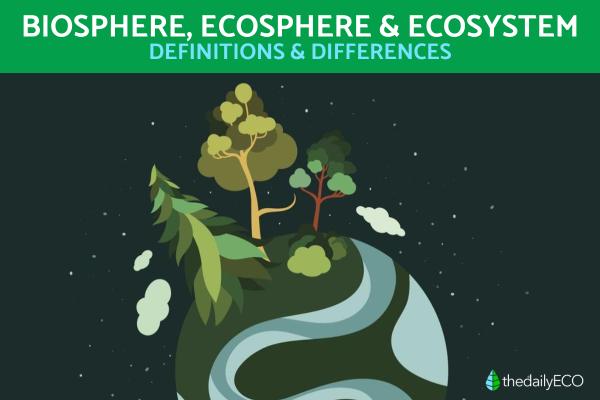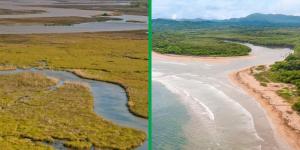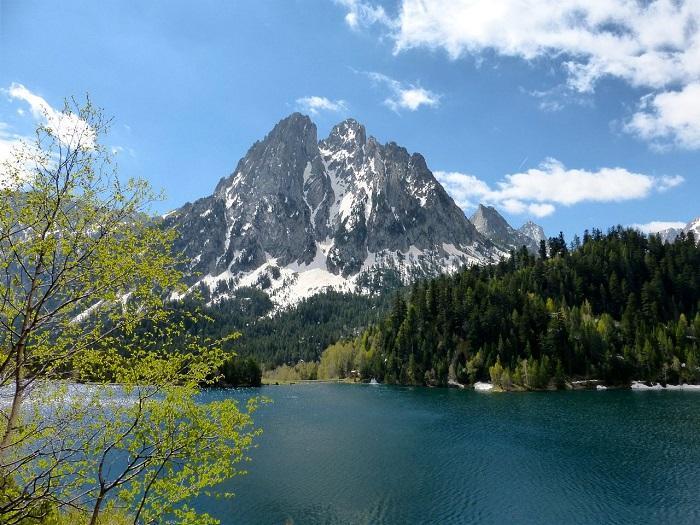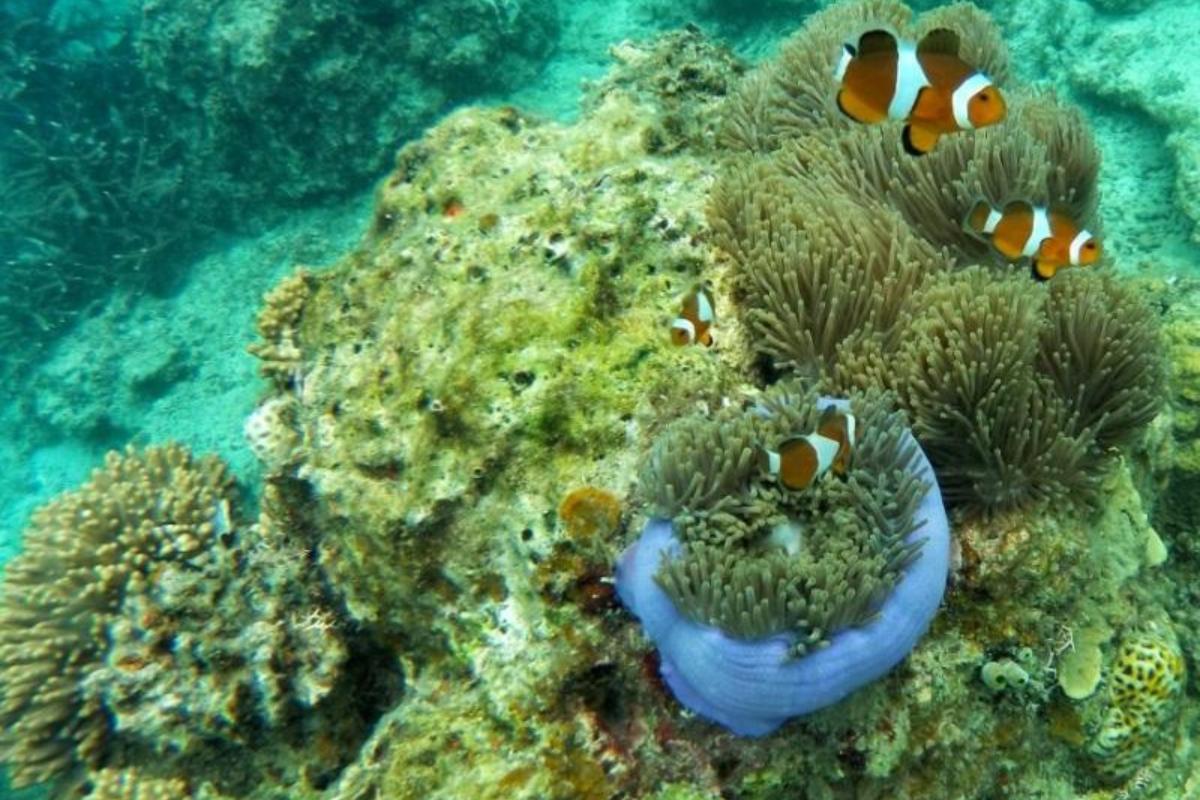The Difference Between Biosphere, Ecosphere and Ecosystem


Understanding the difference between biosphere, ecosphere and ecosystem is important because they are similar environmental concepts. Although closely related, the confusion between them must be avoided if we want to have a better understanding of the environmental sciences. For this reason, thedailyECO provides definitions of the terms biosphere, ecosphere and ecosystem. We compare the concepts and how they relate to both environmentalism and ecology.
Biosphere definition
The biosphere refers to the zone on Earth where all life exists. It encompasses all living organisms, their interactions with each other and their interactions with the physical components of the planet. Our planet Earth is divided into different subsystems of which the biosphere is only one. The others include:
- Atmosphere (gas layer)
- Hydrosphere (water bodies)
- Lithosphere (solid Earth)
In essence, the biosphere represents the sum total of all ecosystems on Earth. It is the dynamic interface where living organisms and their environments interact and shape each other's existence.
The term ‘biosphere’ was coined by the geologist Eduard Suess in the 19th century, but it was popularized and extensively developed by the Russian scientist Vladimir Vernadsky in the early 20th century. Vernadsky's concept of the biosphere went beyond just the biological realm, incorporating the idea that life has a profound influence on Earth's chemical and physical processes. He recognized that life was not a passive element but an active force that shaped the planet's composition and behavior. This holistic view laid the foundation for the modern understanding of the biosphere.
The biosphere can be divided into several interconnected levels of organization:
- Species: individual organisms of the same kind that can interbreed and produce fertile offspring.
- Population: a group of individuals of the same species living in the same area and potentially interacting with one another.
- Community: all the populations of different species that inhabit a particular area and interact with each other.
- Ecosystem: a community of living organisms and their physical environment, including both biotic (living) and abiotic (non-living) factors. Ecosystems can be as small as a pond or as large as a forest.
- Biome: a major regional or global community of plants, animals, and other organisms adapted to a particular climatic and environmental zone. Examples include rainforests, deserts, tundras, and grasslands. Learn more about this concept with our article on the difference between a biome and an ecosystem.
- Biosphere as a whole: the sum of all the interconnected biomes, ecosystems, communities, populations, and species on Earth, and the interactions among them.
The biosphere is a complex and delicate system. Various feedback loops and interactions regulate and maintain the conditions necessary for life to thrive. It plays a vital role in regulating Earth's climate, cycling nutrients, producing oxygen through photosynthesis and providing habitats for countless organisms.
Learn more with our article on the difference between climate and weather.

Ecosphere defintion
The term ‘ecosphere’ is often used interchangeably with ‘biosphere’. To distinguish the difference between biosphere and ecosphere, it can also refer to a specific concept related to the potential habitable zone around a star. This is where conditions might be suitable for life as we understand it. Let's explore both aspects:
Ecosphere as a concept within the biosphere
Within the context of the biosphere, the ecosphere refers to the portion of the Earth's surface and atmosphere where life exists and can thrive. It encompasses all ecosystems, biomes and living organisms on the planet. The ecosphere includes interactions between living organisms and their environments, as well as the various processes that sustain life, such as nutrient cycling, energy flow and adaptation to environmental conditions.
In this sense, the ecosphere is synonymous with the biosphere and represents the dynamic interplay between life and the Earth's physical systems. It encompasses everything from the microscopic organisms inhabiting the deep sea to the vast forests and expansive deserts on land. The ecosphere illustrates the intricate web of relationships and dependencies that shape the diversity of life on Earth.
Ecosphere as a habitable zone
The term ‘ecosphere’ can also be used in the context of astrobiology to describe the region around a star where conditions might be suitable for the existence of life as we know it. This concept is closely related to the ‘habitable zone’ or ‘Goldilocks zone’. This is where conditions are neither too hot nor too cold, allowing for the presence of liquid water. This is a crucial ingredient for life and the reason why Earth is so special in our galaxy.
The ecosphere in this sense represents the range of distances from a star where a planet's surface temperature could support liquid water, a key requirement for the development and sustenance of life as we understand it. Planets within the ecosphere have the potential to maintain stable conditions that could allow for the emergence of life forms similar to those on Earth.
Ecosystem definition
An ecosystem refers to a distinct and self-contained biological community of living organisms interacting with one another and their physical environment. It encompasses the relationships, processes and energy flows that sustain life within a specific geographical area. Ecosystems can vary widely in size and complexity, from a small pond to a vast forest or an entire coral reef.
The concept of an ecosystem has evolved over time, with its modern understanding tracing back to the late 19th and early 20th centuries. Early ecologists, such as Arthur Tansley and Frederic Clements, played pivotal roles in shaping this concept. In 1935, Tansley introduced the term ‘ecosystem’ to describe the dynamic interactions between organisms and their environments, emphasizing the flow of energy and nutrients within a defined space.
In comparison, Clements focused on the idea of a climax community. This is a stable endpoint in the succession of plant species in an area.
This concept emerged as a response to the need for a more comprehensive way to study the relationships between living organisms and their surroundings. It was a departure from earlier approaches that focused primarily on individual species or their interactions. The ecosystem concept considers the interconnectedness of all life forms and their environments. It highlights the importance of understanding the roles of biotic factors such as producers, consumers, decomposers and the abiotic components like soil, water and atmosphere.
As ecological research advanced, scientists began to appreciate the complexity and resilience of ecosystems. They observed how disruptions, such as natural disasters or human activities, could affect the delicate balance of an ecosystem and even lead to irreversible changes. This understanding prompted the development of ecological theories, like the concept of ecological succession, which explains the process of how ecosystems recover and change over time after disturbances.
Discover more about the different types of ecosystems in our related guide.

Main differences between biosphere, ecosphere and ecosystem
In summary, the difference between biosphere, ecosphere and ecosystem is due to terminology. They are distinct yet interconnected terms that describe different aspects of life and its interaction with the environment.
The biosphere refers to the entire zone on Earth's surface where life exists, including living organisms and their interactions with the planet's physical components.
The ecosphere can indicate either the entirety of the biosphere or the region around a star where conditions might permit life to thrive.
An ecosystem is a localized biological community comprising living organisms and their interactions with each other and the abiotic environment. It emphasizes the dynamic flow of energy and nutrients within a specific area.
While the biosphere and ecosphere encompass broader aspects of life on Earth and its potential beyond, an ecosystem focuses on the intricate relationships within specific geographical boundaries. Understanding these terms provides insights into the complexities of life's existence and its intricate connections with the surroundings.
If you want to read similar articles to The Difference Between Biosphere, Ecosphere and Ecosystem, we recommend you visit our Facts about nature category.







